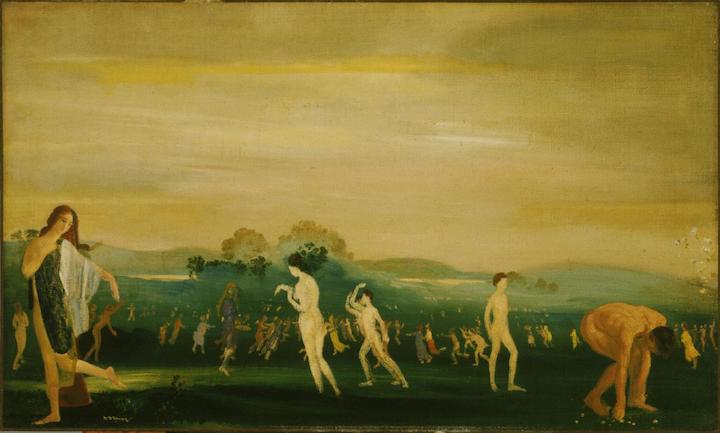In the ancient Mediterranean world, there was a widespread belief that, once upon a time, back at the beginning of the human race, everybody lived in an ideal world, in which there was peace and plenty, no crime, no war, no hatred. A golden age.
In the first book of his Metamorphoses (a kind of encyclopedia of Greek myths done into Latin verse), Ovid gives a description of this Age of Gold. The Age of Gold, however, was followed by a somewhat inferior age, the Age of Silver, which in turn was followed by the even more inferior Age of Bronze, and this, in turn, was followed by the quite dreadful Age of Iron – the age we unfortunate human beings have lived in ever since.
This Greco-Roman belief in a decline from a golden age is much like the Jewish-Christian belief in the Fall from the Garden of Eden, with a few differences. Eden had only two persons living in the Garden, while the Greco-Roman paradise had many. Adam and Eve, when they sinned, fell immediately from paradise to misery; the pagans had a long downhill slide.
But the basic story is the same: at the beginning everything was lovely – and then we lost it all. According to the pagans, we lost it forever; we will never get back to paradise. But in the Christian version of the story, it is quite possible that we – some anyway – will return to paradise.
Jesus Christ, the God-man, died for our sins, thus opening that possibility. But this time it won’t be an earthly paradise; rather, it will be a paradise we will enter after death. Unfortunately, however, not everyone will make it to Heaven. Everybody will have an opportunity to make it. But some (perhaps the great majority of the human race, as many Augustinians have held) will fall (or leap) into Hell.
For many centuries this idea – that there exists an other-worldly paradise that each of us may (or may not) enter after death – was an important element of the worldview (Christianity) that dominated the Western world, the world that used to be called Christendom.
But for a few centuries now, Christianity had been gradually losing its grip on Western minds, and as this has happened many people, even people who, in this our age of non-faith, still think of themselves as Christians, have found it increasingly difficult to believe that we truly live after death.
But the belief that there must be a paradise has not died. Ironically, those who have the least belief in Christianity have the greatest belief in the possibility of a paradise on Earth. When I say this, I have especially in mind the old communists who made a revolution in Russia, people like Lenin and Trotsky and Stalin. They held that their revolution, when suitably developed over the course of a few decades, or perhaps a few centuries, would eventuate in a worldwide democratic society abounding in freedom, equality, and prosperity.

This eventual result being so glorious, so unspeakably excellent, it would justify any means needed to bring it about. Therefore, it would justify, among many other horrible things, tyranny and mass murder. As Stalin (an ex-seminarian) went to bed at night he could say to himself, “Woe is me, I am a wicked man, but my wickedness is needed for the future happiness of the human race.”
Well, communism failed – notwithstanding the fact that there still exist dictatorial ruling parties in the world that call themselves communist, e.g., in China, North Korea, Vietnam, and Cuba. But the utopian-revolutionary impulse that manifested itself in communism a hundred years ago is still alive and well.
It is a potentially murderous virus that can be found in the hearts and minds of many atheistic young persons who fancy themselves to be far more intelligent, far wiser, and far more gifted with prophetic vision than the average human being. They see themselves as the “brains” of this glorious revolution.
But if the “brains” are to succeed, they will need “muscle.” And since brains are not sufficiently muscular themselves, they will need truly muscular (and not-very-brainy) allies. In the old days, the revolutionary brains thought that the urban working class would provide the needed muscle.
Alas (for the revolutionaries), it turned out that the working class didn’t really want a revolution. The capitalist rulers of society bought off the workers by providing them with a decent standard of living. Give workers a 40-hour week, old-age pensions, health insurance, and upward mobility opportunities for their kids, and the revolutionary helium soon goes out of the balloon.
Having abandoned the old hope that the working class would provide the needed revolutionary muscle, today’s revolutionary brains look about for a new muscular ally, a new and better revolutionary proletariat. Many believe that they have found this ally, or at least this potential ally, in the “colored” persons of the world.
Today’s great division on the planet Earth, as these brainy revolutionaries see it, is that between (a) a wealthy and oppressive ruling minority of whites, most of whom live in Europe and North America, and (b) the oppressed of the world, almost all of whom are “persons of color.”
If you define “persons of color” (P.O.C.) broadly to include not just “black” and “brown” people, but also East Asians, Arabs, Muslims, and almost anybody with a Spanish surname (except perhaps for Penelope Cruz and the King of Spain), it turns out that the world’s P.O.C.s vastly outnumber “whites”; which means P.O.C.s – guided of course by the brainy people – will eventually overthrow the whites and abolish capitalism and create a Heaven-on-Earth.
Or so our revolutionaries think. But to judge by how eager P.O.C.s are to enter America, Europe, etc., maybe, just maybe, they’re betting on another illusory myth, while people of color show a preference for capitalism and ancestral faith.
__________















